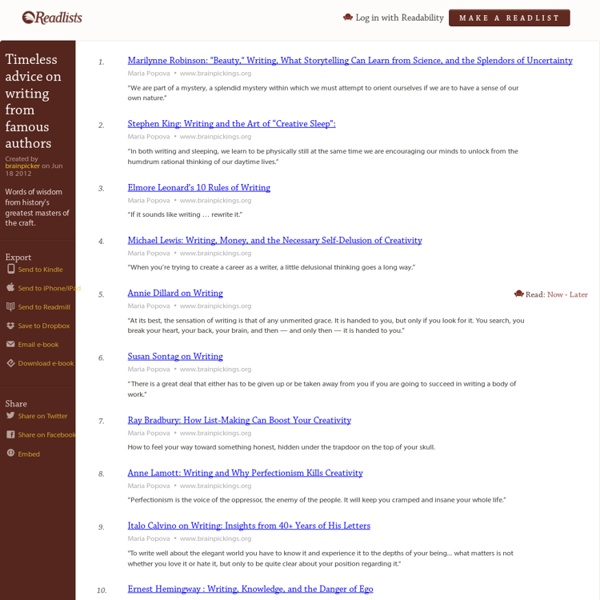



Apache OpenOffice - Official Site - The Free and Open Productivity Suite Malcolm Gladwell Is Underrated — I.M.H.O. I know - it’s like proposing The Beatles are underrated. Malcolm Gladwell is the king of non-fiction writing and publishing. His new book is a million-seller lock. But sometimes, popularity can obscure achievement, and such is the case with Gladwell (by the way, The Beatles are underrated, but that’s for another day). Among our tablet-toting, Foreign Policy-reading, Foucault-citing cultural elites, Gladwell’s name is rarely mentioned without a hint of ironising disdain. “Well I suppose that’s just the Malcolm Gladwell version (of a complex idea).” “It’s the kind of glib formula pioneered by Malcolm Gladwell.” “Yeah, Gladwell? When lists of “Most Influential Thinkers” are put together, Gladwell rarely makes the top cut. Non-fiction, ideas-based narratives are everywhere these days, but the space was opened up by the stunning success of The Tipping Point and Blink. Here’s another thing that distinguishes him: he can write. Gladwell is also a more serious thinker than his critics allow.
Greg Egan’s Home Page Sometimes, I Write About Why I Write. This Is That. Note: this post was originally written on Feb 22, 2012. I've recently been readdressing many aspects of my life and my work, and in digging through my writing, found this. I shared it with a dear friend and was motivated to share it again with you all. I hope it speaks to you and gives you some insight to why I have done and will do what I do. This post is a bit of an experiment. So, I ask that you indulge me and do me a favor: Play this song while you read this post. You certainly don't have to. And lately, why I write has been a question on my mind. Sometimes, I know exactly what I'm doing when I post something deep and introspective and heartfelt. Sometimes, I just want to be crass. Sometimes, I want to explore emotion. Sometimes, I have something in me I just need to share. Sometimes, I want to call bullshit on what I, you and everyone else knows is bullshit. Sometimes, I am scared. Sometimes, I just hurt, and I need to bleed. Sometimes, I want you to laugh. This isn't my curse.
What are some things that full time writers know that most people don't? - Quora Poetry Isn't as Useless as a Lot of Poets Say It Is - Noah Berlatsky A recent speech at Yale inadvertently sums up what's wrong with the art form these days: Its gatekeepers believe poetry matters because it's poetry, not because of what it says. Rudyard Kipling and Nicki Minaj, poets. (Wikimedia, AP Images) Poetry is useless. That's the prevailing sentiment in our culture, as far as I can tell. Oddly, this isn't just the position of outsiders. Standing apart I looked at her and said – We have poetry So we do not die of history. Poetry, then, is contrasted with history and the world; it's outside cause and effect and even reason. Even without Alexander's painful reliance on clichéd phrases like "deeply felt," this is all familiar, of course. "There have been moments in our shared human history in particular parts of the world where poets and also singers have been banned," Alexander says. But why? Poetry is always already revolutionary, then. Of course, this is nonsense. The point here is that poetry, as poetry, is, in fact, useless.
What is the best way to improve writing skills and become a master of it? - Quora Letters of Note The Describer's Dictionary: A Treasury of Terms & Literary Quotations (Treasury of Terms and Literary Quotations): David Grambs: 9780393312652: Amazon.com: Books You've got to sell your heart Late-1938, eager to gain some feedback on her work, aspiring young author and Radcliffe sophomore Frances Turnbull sent a copy of her latest story to celebrated novelist and friend of the family, F. Scott Fitzgerald. Before long the feedback arrived, in the form of the somewhat harsh but admirably honest reply seen below. (Source: F. November 9, 1938Dear Frances:I've read the story carefully and, Frances, I'm afraid the price for doing professional work is a good deal higher than you are prepared to pay at present.
How to Write Diploma, Master or PhD Thesis? How to Write Diploma, Master or PhD Thesis? Guidelines for writing a diploma, master or PhD thesis In this article I will try to briefly explain how to organize the contents of your thesis, mainly the outline what should be each chapter (or section) about. The guidelines in this article are mainly relevant to Computer Science, Computer Engineering, Computer Architecture subjects but I guess they can apply for other engineering (such as Electrical Engineering, Mechanical Engineering) and science disciplines. The structure of you thesis is good to follow the following structure: 1. You should be very careful choosing a title for your thesis. 2. Write to whom you dedicate you thesis if any. 3. It’s good to acknowledge the people who helped or participated in direct or indirect way to your thesis. 4. Abstract is very important part of the thesis. · About the problem you want to solve · about your solution – how you solve the problem · possible impacts of your work into the field (e.g. 5. 6. 7.